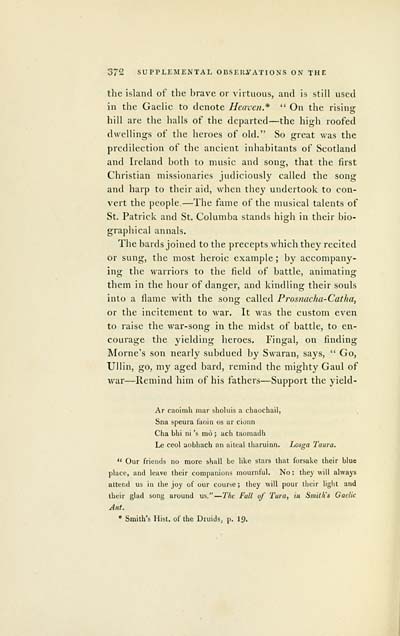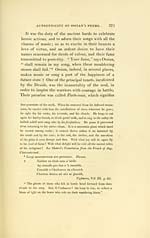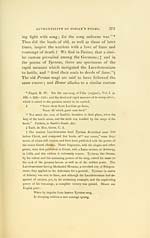J. F. Campbell Collection > Poems of Ossian > Volume 3
(384)
Download files
Complete book:
Individual page:
Thumbnail gallery: Grid view | List view

372 SUPPLEMENTAL OBSEIiyATIONS ON THE
the island of the brave or virtuous, and is still used
in the Gaelic to dcnote Heaven.* " On the rising
hiU are tlie halls of the departed — the high roofed
dwellings of the heroes of ohl." So great was the
predilection of the ancient inhabitants of Scotland
and Ireland both to nuisic and song, that the first
Christian missionaries judiciously called tlie song
and harp to their aid, when tliey undertook to con-
vert the people — The fanie of the niusical talents of
St. Patrick and St. Columlm stands higli in their bio-
graphical annals.
The bards joined to the preccpts which they reclted
or sung, the most heroic example ; by acconipany-
ing the \varriors to the field of battle, animating
them in the hour of danger, and kindling their souls
inlo a flame with the song called P rosnacha-Catha,
or the incitement to war. It was the custom even
to raise the war-song in the midst of battle, to en-
courage the yielding heroes. Fingal, on finding
Morne's son nearly subdued by Swaran, says, " Go,
UlHn, go, my aged bard, remind the mighty Gaul of
war — Remind him of his fathers — Support the yield-
Ar raoimli inar sholuis a chaochail,
Sna speura faoin os ar cionn
Cha bhi ni 's mò ; ach tanmadh
Le ceol aobliach an aitcal tharuinn. Losga Taura.
" Our friends no more shall be like stars that forsakc their blue
place, and leave their companions mournful. No : they will always
attend us in ihe joy of our course ; they wiU pour their light and
their glad song around us." — The FuU of Tura, in Smith's Gaclic
Ant.
* Smith's liist. of thc Druids; p. ÌQ.
the island of the brave or virtuous, and is still used
in the Gaelic to dcnote Heaven.* " On the rising
hiU are tlie halls of the departed — the high roofed
dwellings of the heroes of ohl." So great was the
predilection of the ancient inhabitants of Scotland
and Ireland both to nuisic and song, that the first
Christian missionaries judiciously called tlie song
and harp to their aid, when tliey undertook to con-
vert the people — The fanie of the niusical talents of
St. Patrick and St. Columlm stands higli in their bio-
graphical annals.
The bards joined to the preccpts which they reclted
or sung, the most heroic example ; by acconipany-
ing the \varriors to the field of battle, animating
them in the hour of danger, and kindling their souls
inlo a flame with the song called P rosnacha-Catha,
or the incitement to war. It was the custom even
to raise the war-song in the midst of battle, to en-
courage the yielding heroes. Fingal, on finding
Morne's son nearly subdued by Swaran, says, " Go,
UlHn, go, my aged bard, remind the mighty Gaul of
war — Remind him of his fathers — Support the yield-
Ar raoimli inar sholuis a chaochail,
Sna speura faoin os ar cionn
Cha bhi ni 's mò ; ach tanmadh
Le ceol aobliach an aitcal tharuinn. Losga Taura.
" Our friends no more shall be like stars that forsakc their blue
place, and leave their companions mournful. No : they will always
attend us in ihe joy of our course ; they wiU pour their light and
their glad song around us." — The FuU of Tura, in Smith's Gaclic
Ant.
* Smith's liist. of thc Druids; p. ÌQ.
Set display mode to: Large image | Transcription
Images and transcriptions on this page, including medium image downloads, may be used under the Creative Commons Attribution 4.0 International Licence unless otherwise stated. ![]()
| Early Gaelic Book Collections > J. F. Campbell Collection > Poems of Ossian > Volume 3 > (384) |
|---|
| Permanent URL | https://digital.nls.uk/81286360 |
|---|
| Description | Vol. III. |
|---|---|
| Shelfmark | Cam.1.b.5 |
| Additional NLS resources: | |
| Attribution and copyright: |
|
| Description | Volumes from a collection of 610 books rich in Highland folklore, Ossianic literature and other Celtic subjects. Many of the books annotated by John Francis Campbell of Islay, who assembled the collection. |
|---|
| Description | Selected items from five 'Special and Named Printed Collections'. Includes books in Gaelic and other Celtic languages, works about the Gaels, their languages, literature, culture and history. |
|---|

